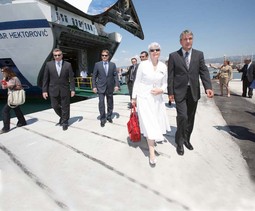Published in Nacional number 766, 2010-07-20
They'd like a little more time in power: rather than in the spring, the HDZ will call the elections in November of 2011
In expectation of economic recovery in Croatia, every delay benefits the HDZ
 PRIME MINISTER Jadranka Kosor feels that the HDZ has a stable majority in Parliament and that putting off the elections to a later date suits the partyThe Croatian Democratic Union has abandoned the idea of holding the elections for Parliament in the spring of 2011, several sources from the party leadership have confirmed for Nacional. Prime Minister Jadranka Kosor said on Sunday at a reception of new members to the HDZ youth organisation, Mladez HDZ, that the party will need new strength for the parliamentary elections. And while, according to the law, the elections will be regular regardless of which month in 2011 they are held in, the HDZ has decided to wait out the end of the year.
PRIME MINISTER Jadranka Kosor feels that the HDZ has a stable majority in Parliament and that putting off the elections to a later date suits the partyThe Croatian Democratic Union has abandoned the idea of holding the elections for Parliament in the spring of 2011, several sources from the party leadership have confirmed for Nacional. Prime Minister Jadranka Kosor said on Sunday at a reception of new members to the HDZ youth organisation, Mladez HDZ, that the party will need new strength for the parliamentary elections. And while, according to the law, the elections will be regular regardless of which month in 2011 they are held in, the HDZ has decided to wait out the end of the year.
Their reasoning for the decision is the claim that the first signs of economic recovery and an end to the crisis will be felt by the autumn of 2011, and an agreement on accession to the European Union will likely be signed in the meantime. Top HDZ officials are also of the opinion that time is working against the SDP-led coalition and that a later election date will lead to rifts among the coalition partners on the left. The leadership of the ruling party has for several months now deliberated over the option of delaying the election date as much as possible. Three months ago there were reports that the HDZ would call the elections in April of next year, as the party's leadership had allegedly concluded that they needed to take advantage of the positive feelings that would be engendered by the completion of the negotiations with the European Union. Several unexpected developments have taken place on the Croatian political scene in the meantime, however, based on which it was deemed that it would be very beneficial to the HDZ to wait on the elections another half year.
Last week the HSLS (Croatian Social-Liberal Party) left the ranks of the ruling coalition, which initially suggested the start of the breakdown of the coalition agreement between the HDZ and the parties in Parliament that back the executive government. In the end, however, the HSLS move proved more beneficial than damaging to the HDZ - the HSLS lost its most influential politicians, who have left the party and will, as independent MPs, continue to support the governing coalition in Parliament. Instead of the support of the 82 MPs it had enjoyed, the HDZ will now be able to count on the votes of 83, and the continuing support of all other current coalition partners, who have made it very clear that they will continue to back the current administration up to the elections. Besides all this the HDZ feels that a delay on the date of the elections could further hurt the position of the "Kukuriku" coalition, especially that of the coalition leader, the SDP.
Among other things, the ruling party feels that their chief opponents will be weakened by the situation surrounding Varsavska Street, since the Zagreb chapter of the SDP is considered most responsible for the outcome of last week's events in downtown Zagreb. And the HDZ expects to see the Daimler lorry purchase scandal resurface in the coming months, where the former SDP-led ruling coalition allegedly short-changed the state for 182 million kuna. But, besides this all, the key reason that the HDZ has decided to not rush into the 2011 elections is the fact that the economic crisis is still ongoing in Croatia, and the fact that the HDZ will have to implement many more painful cuts before the year is out, which could earn the party a further drop in popularity among voters. In expectation of economic recovery in Croatia, every delay, therefore, benefits the HDZ.
Related articles
Sanader’s eight fear SDP — Won’t bring down Government
Despite forecasts that he would, former Croatian Prime Minister Ivo Sanader, who recently took his seat in Parliament, will not work from the house… Više
Latest news
-
28.10.2010. / 14:15
'A profitable INA is in everyone's interest'
-
28.10.2010. / 09:38
Sanader’s eight fear SDP — Won’t bring down Government
-
21.10.2010. / 15:02
Interior Ministry turned a blind eye on Pukanic assassination
-
20.10.2010. / 09:34
Barisic could bankrupt HDZ




